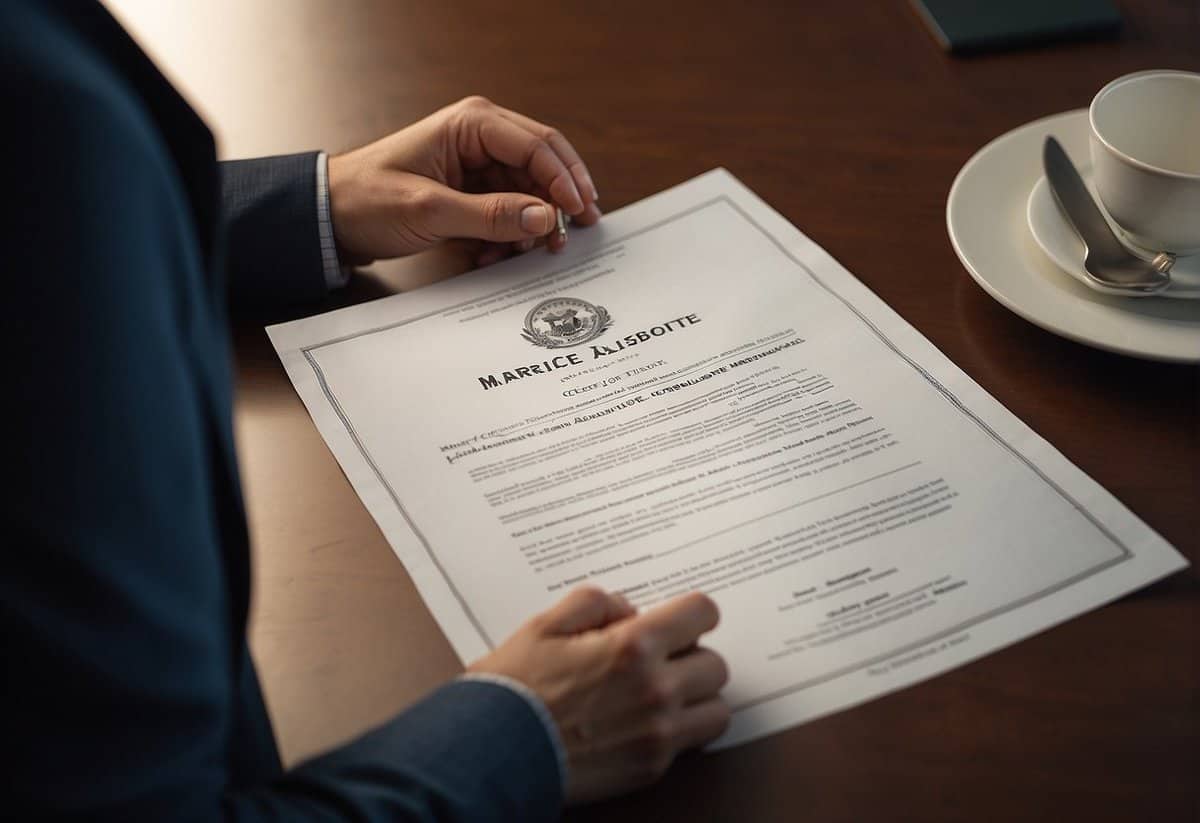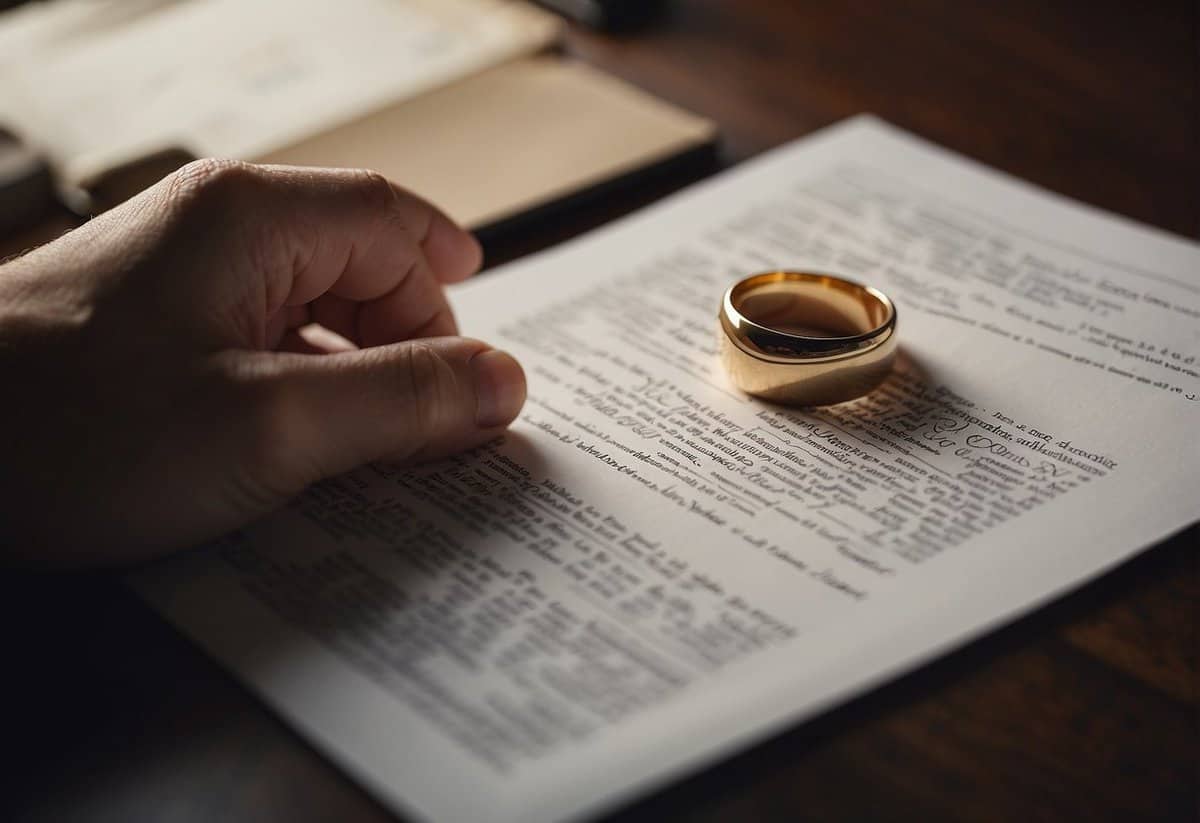Can I Get Married Without My Decree Absolute? Understanding Legal Marital Status
Embarking on a new marriage when you’ve previously been wed comes with its own set of legalities, the most significant being the necessity of a decree absolute. Obtaining your decree absolute is a crucial step in the divorce process, marking the legal end of your previous marriage. Without this document, your marital status remains legally bound to your former partner, rendering any new marriage ceremony void and without legal standing.

If you’re considering remarrying, it’s important to ensure that you are legally eligible to do so. The decree absolute is more than just a piece of paper; it signifies the court’s confirmation that your marriage has officially ended. Not having this document could complicate the process of giving notice to marry, affect financial settlements, and potentially involve you in legal repercussions due to bigamy, which is a criminal offense in many jurisdictions.
Key Takeaways
- Ensure you have a decree absolute before remarrying to legally terminate your previous marriage.
- Remarrying without a decree absolute could result in your marriage being considered legally invalid.
- The absence of a decree absolute can complicate legal procedures and financial settlements post-divorce.
Understanding the Divorce Process

Navigating the steps of legally ending a marriage can be complex. It’s important you understand each phase from the initial petition to the final order, as they are crucial for the dissolution of your marriage.
From Petition to Final Order
The divorce process begins when you or your spouse files a divorce petition at the family court. This is a formal request for the dissolution of your marriage. In England and Wales, the introduction of no-fault divorce means that this petition doesn’t require blaming one party for the breakdown of the marriage. A conditional order is the first significant milestone in the proceedings, signalling the court’s acknowledgment that there is no reason why the divorce cannot proceed.
Conditional Order and Its Significance
About 20 weeks after the divorce application is submitted, if all requirements are met, the court may grant a conditional order. It’s a significant step that essentially states the court sees no barriers to the divorce. However, it does not yet end the marriage; rather, it indicates the countdown to the final order has begun.
Decree Nisi and Decree Absolute Explained
The decree nisi is a provisional “yes” from the court – it means the judge agrees you can divorce. However, it’s the decree absolute that legally ends your marriage, and you usually must wait 6 weeks after the decree nisi before you can apply for it. Once the decree absolute is issued, your marriage is officially dissolved, and you are free to remarry.
Remember, until the decree absolute is in hand, your marital status remains unchanged, which restricts you from entering into another marriage. Understanding each legal document and phase is crucial for anyone going through separation in the family law system of England and Wales.
Eligibility and Implications of Remarrying

Before you consider walking down the aisle again, it’s crucial to understand the legalities and possible consequences. Remarrying without crossing your t’s and dotting your i’s could lead to complex legal situations.
Legal Requirements for Remarriage
To legally remarry, you must have a final divorce decree, also known as a decree absolute if you’re in certain jurisdictions. This document serves as proof that your former marriage has been completely dissolved. When applying for a marriage license, you’ll be asked to present the original or a certified copy of your divorce decree to prove you’re eligible to remarry.
Essential Documents for Remarriage:
- Divorce decree (decree absolute)
- Valid identification (e.g., driver’s license, passport)
- Marriage certificate (if you’re the petitioner or respondent in the previous marriage)
Consequences of Remarrying Without a Decree Absolute
Remarrying without having your decree absolute can have serious legal implications. Your new marriage would be considered bigamous and therefore invalid. This could lead to legal action against you. Moreover, if you’re the petitioner in the divorce and you remarry without the decree absolute, any financial claims you have against your former spouse may be negatively affected.
Remember:
- A new marriage certificate without a corresponding divorce decree is not legally binding.
- This applies to both original marriages and civil partnerships that have not been legally dissolved or annulled.
Careful consideration and complete adherence to legal requirements are non-negotiable before you can commit to a new partner in matrimony.
Financial Settlements and Court Orders

When you’re going through a divorce, understanding the interplay between financial settlements and court orders is crucial. These are vital to ensure that all assets are fairly divided, and both parties’ financial futures are secure.
Navigating the Financial Aspects of Divorce
Divorce is more than just a legal separation; it’s a division of a life you’ve built together, which includes your assets and pensions. Before finalizing your divorce with a decree absolute, you must consider the financial settlement. This agreement outlines how you will divide assets, handle spousal maintenance, and share any pensions. It’s essential to settle these financial matters amicably to avoid long, costly delays and ensure you can both move forward with certainty.
Understanding Consent Orders
A consent order makes your financial agreement legally binding. This order will detail how you intend to split assets and any financial provision for children or spousal maintenance. Ensuring these agreements are thorough can help prevent future financial claims or disputes over unexpected inheritance, gifts, or earnings.
The Role of Court in Financial Disputes
If you can’t agree, the court can issue a financial order to settle the matter. This process might increase costs and delays, but sometimes it’s necessary to resolve complex issues fairly. It’s essential that your financial rights are protected, so working with a court might bring a much-needed resolution, especially if there are sizable assets or pensions involved. Remember, the court’s goal is to distribute assets and income to reflect each partner’s contribution to the marriage and ensure both have financial security post-divorce.
By focusing on these areas, you can make informed decisions during your divorce, ensuring you protect your financial health for the future.
Practical Considerations and Next Steps

Before reapplying for marriage, ensuring all your divorce documentation is accurate and complete is crucial to avoid further delays. Here are specific steps to effectively conclude your case:
Preparing Your Divorce Documentation
Make sure to have your case number and court number on hand. Your divorce papers, including the Decree Nisi, are critical. Without the finalization of your divorce through the Decree Absolute, you still legally remain married, and thus cannot remarry. Double-check all details, such as time limits for filing after a Decree Nisi, to ensure accuracy.
Dealing with Potential Delays
Delays can occur if all terms, specifically regarding assets or custody, aren’t agreed upon. Be proactive; if you face a delay due to a contest or issues with court orders, it’s essential to communicate effectively with both your legal advisor and the court. In cases where a passport is needed, for example, to amend a child’s passport details following a divorce, know that the Decree Absolute is essential.
How to Effectively Conclude Your Case
If you’re the sole applicant in the divorce, you must wait for a period after the Decree Nisi before making an application for the Decree Absolute to end your marriage. If there are no contests or outstanding grounds for divorce, the application should be straightforward. Once you receive your Decree Absolute, keep it safe as it’s needed for any legal marriage thereafter.
Frequently Asked Questions

In this section, you’ll find specific answers to common concerns about remarriage and the necessary documentation after a divorce, such as if a divorce decree is essential and what happens if you try to remarry without one.
Are previous marriages verified when applying for a new marriage license?
When you apply for a marriage license, the issuing authority will typically check to confirm that any previous marriages have been legally ended. You are required to declare your marital status and, in most cases, provide documentation such as a divorce decree.
Is it necessary to disclose a prior marriage when remarrying?
Yes, it is necessary to disclose any prior marriages when you remarry. Not only is this administratively important, but it is also legally required to ensure all parties are entering the marriage free from prior matrimonial bonds.
What documents are required in California to remarry after a divorce?
In California, you will need to provide proof of your divorce, often in the form of a divorce decree, when applying to remarry. This serves to prove your marital status is legally free to engage in a new marriage.
In Texas, must I present my divorce decree to legally remarry?
Yes, in Texas, you are required to present a copy of your divorce decree as a part of the application process for a new marriage license. This official document serves as confirmation that your previous marriage has been dissolved.
What are the legal consequences of remarrying without a finalized divorce?
Remarrying without a finalized divorce is considered bigamy, which is illegal. If discovered, the second marriage would be legally void and there could be legal repercussions such as fines or even imprisonment.
How can I procure a copy of my divorce decree online for remarriage purposes?
To get a copy of your divorce decree online, check with the court where your divorce was finalized. Many courts offer an online records request system where you can obtain copies of important documents for your records and future use, such as remarriage.


